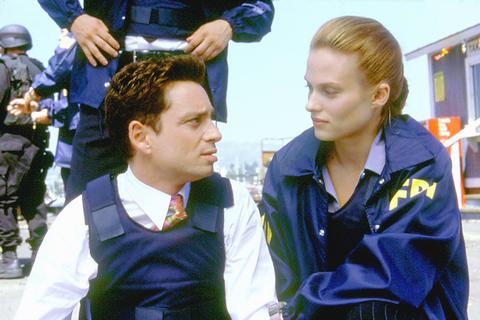Rated PG, directed by Rob Pritts, with Chris Kattan (Corky Romano), Vinessa Shaw (Agent Kate Russo), Peter Falk (Pops Romano), Peter Berg (Paulie Romano), Chris Penn (Peter Romano), Fred Ward (Leo Corrigan) and Richard Roundtree (Howard Shuster), running time: 85 minutes
Saturday Night Live stooge Chris Kattan is Corky Romano, the dandy son of a Mafia boss who, at his family's behest, goes undercover as an FBI agent in order to snatch information that incriminates his recently indicted father in a life crime. Once inside, Corky falls for a beautiful, no-nonsense agent played by Vinessa Shaw, while he scrambles to steal the evidence the FBI has on his dad. Kattan's performance recalls the zaniness of a Jerry Lewis comedy or the pratfall humor of a Rowan Atkinson movie. Peter Falk, Peter Berg and Chris Penn as Corky's Mafia family help make the movie worth watching.

PHOTO COURTESY OF BUENA VISTA

In the March 9 edition of the Taipei Times a piece by Ninon Godefroy ran with the headine “The quiet, gentle rhythm of Taiwan.” It started with the line “Taiwan is a small, humble place. There is no Eiffel Tower, no pyramids — no singular attraction that draws the world’s attention.” I laughed out loud at that. This was out of no disrespect for the author or the piece, which made some interesting analogies and good points about how both Din Tai Fung’s and Taiwan Semiconductor Manufacturing Co’s (TSMC, 台積電) meticulous attention to detail and quality are not quite up to

April 21 to April 27 Hsieh Er’s (謝娥) political fortunes were rising fast after she got out of jail and joined the Chinese Nationalist Party (KMT) in December 1945. Not only did she hold key positions in various committees, she was elected the only woman on the Taipei City Council and headed to Nanjing in 1946 as the sole Taiwanese female representative to the National Constituent Assembly. With the support of first lady Soong May-ling (宋美齡), she started the Taipei Women’s Association and Taiwan Provincial Women’s Association, where she

Chinese Nationalist Party (KMT) Chairman Eric Chu (朱立倫) hatched a bold plan to charge forward and seize the initiative when he held a protest in front of the Taipei City Prosecutors’ Office. Though risky, because illegal, its success would help tackle at least six problems facing both himself and the KMT. What he did not see coming was Taipei Mayor Chiang Wan-an (將萬安) tripping him up out of the gate. In spite of Chu being the most consequential and successful KMT chairman since the early 2010s — arguably saving the party from financial ruin and restoring its electoral viability —

It is one of the more remarkable facts of Taiwan history that it was never occupied or claimed by any of the numerous kingdoms of southern China — Han or otherwise — that lay just across the water from it. None of their brilliant ministers ever discovered that Taiwan was a “core interest” of the state whose annexation was “inevitable.” As Paul Kua notes in an excellent monograph laying out how the Portuguese gave Taiwan the name “Formosa,” the first Europeans to express an interest in occupying Taiwan were the Spanish. Tonio Andrade in his seminal work, How Taiwan Became Chinese,